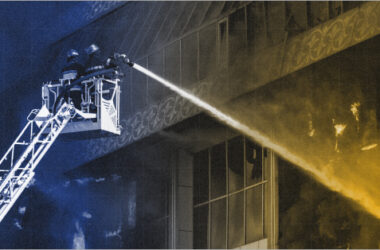In a country like India, where the monsoon season brings heavy rains and the summer months can be scorching, the risk of fire and natural calamities is ever-present. Whether it’s a devastating fire in a residential area or the aftermath of a cyclone in coastal regions, the financial implications can be overwhelming. This is where insurance steps in as a safety net.
The Standard Fire and Special Perils Policy (SFSP) was historically a cornerstone of property insurance, offering coverage against a range of risks. However, as the insurance landscape evolves, so do the products available to consumers.
What is SFSP?
The SFSP is a traditional insurance policy that provides coverage against fire and allied perils. It encompasses:
- Fire: Protection against damages caused by fire outbreaks.
- Special Perils: A range of additional risks, including natural and man-made disasters.
This policy was designed to safeguard property owners from significant financial losses due to unforeseen events. However, from April 2021, the Insurance Regulatory and Development Authority of India (IRDAI) introduced a new set of standard policies for residential and small commercial properties, thereby replacing SFSP for certain customer segments.
SFSP policies are now mainly used for customised or large-value risks, typically where the total sum insured exceeds ₹50 crore, or where coverage requirements go beyond the scope of standard products.
Evolution of Fire Insurance in India
Historically, Fire Insurance in India was governed by the All India Fire Tariff (AIFT), 2001, which prescribed standardised terms, conditions, and pricing for fire insurance policies. Over time, IRDAI gradually allowed de-tariffing, giving insurers the flexibility to customise cover and pricing for specific needs, especially for larger risks.
In 2021, recognising the need for more accessible and simplified policies for individuals and small businesses, IRDAI launched three standard products:
- Bharat Griha Raksha: Aimed at homeowners.
- Bharat Sookshma Udyam Suraksha: For enterprises with property value up to ₹5 crore.
- Bharat Laghu Udyam Suraksha: For enterprises with property value between ₹5 crore and ₹50 crore.
These products replaced the traditional SFSP for these segments and offer broader, simplified, and standardised coverage.
Key Features of SFSP (and Bharat Policies)
Comprehensive Coverage
Depending on the policy type (SFSP or Bharat series), coverage includes:
- Fire: Damages caused directly by fire.
- Lightning: Strikes resulting in property damage.
- Explosion/Implosion: Incidents due to pressure changes.
- Aircraft Damage: Impact from aircraft or aerial devices.
- Riot, Strike, Malicious Damage (RSMD): Civil unrest-related perils.
- Storm, Cyclone, Flood, Tempest: Severe weather conditions.
- Impact Damage: Accidental damage from moving vehicles or machinery.
- Burglary: Optional under SFSP but included in Bharat Griha Raksha under specific limits.
- Bursting/Overflowing of Water Tanks: Internal water damage due to plumbing issues.
- Missile Testing Operations: Damage from government-authorised tests.
- Subsidence and Landslide: Ground movement resulting in structural damage.
- Leakage from Sprinkler Systems: Accidental discharge causing damage.
- Bush Fire: Wildfires occurring near the insured property.
Flexible Sum Insured
Policyholders can choose the sum insured based on the reinstatement value (cost of replacing the property as new) or market value (depreciated value). This allows for more appropriate coverage aligned with the actual value of the property.
Optional Add-Ons
Additional covers may be included, such as:
- Earthquake (optional in SFSP; included in Bharat policies)
- Terrorism cover
- Loss of rent
- Architects’, surveyors’, and consulting engineers’ fees
- Debris removal
- Machinery breakdown cover (for industrial users)
These enhance the scope of the base policy, particularly in high-risk areas or for critical business infrastructure.
Exclusions Under SFSP and Bharat Policies
Despite broad coverage, certain exclusions apply to both SFSP and the newer standard policies:
- War and Allied Perils: Damages arising from war, invasion, or civil war.
- Nuclear Risks: Losses due to nuclear reactions or radioactive contamination.
- Pollution and Contamination: Unless directly caused by an insured peril.
- Willful or Fraudulent Acts: Damage caused intentionally or due to gross negligence.
- Consequential Losses: Indirect financial losses such as loss of market or income (unless covered under a separate policy).
- Normal Wear and Tear: Gradual deterioration or depreciation.
- Unoccupied Premises: If left vacant for extended periods without prior notice.
- Valuable Papers, Currency, or Works of Art: Unless explicitly insured.
- Data Loss: Destruction or corruption of electronic data.
Note: Earthquake cover is included in Bharat Griha Raksha, Sookshma Udyam, and Laghu Udyam policies but optional under the traditional SFSP.
Who Should Opt for SFSP or Bharat Policies?
These insurance products cater to a wide range of property owners:
- Homeowners: Bharat Griha Raksha is ideal for individuals looking to protect their residence and contents.
- Small and Medium Enterprises (SMEs): Bharat Sookshma or Laghu Udyam Suraksha is applicable based on the scale of operations.
- Industrial Units: SFSP or Industrial All Risk (IAR) policies are used for larger factories or specialised manufacturing units.
- Commercial Establishments: Shops, offices, and warehouses may opt for suitable coverage depending on their property valuation.
How to Purchase Fire Insurance in India
Buying property insurance in India is straightforward:
- Choose an Insurer: Select an IRDAI-licensed general insurance company.
- Identify the Applicable Product:
- For property value up to ₹5 crore: Bharat Sookshma Udyam Suraksha.
- ₹5 crore to ₹50 crore: Bharat Laghu Udyam Suraksha.
- Over ₹50 crore or special risks: SFSP or custom fire insurance products.
- Assess Property Value: Use market value or reinstatement value as basis.
- Choose Add-Ons: Select optional covers based on your risk profile.
- Submit Documents: Identity proof, property ownership documents, and business details.
- Pay the Premium: Based on risk exposure, location, add-ons, and claim history.
These policies can be purchased online via insurer websites, insurance marketplaces, or offline through agents and brokers.
Premium Calculation Factors
Several elements influence the premium under SFSP or the Bharat policies:
- Sum Insured: Higher values result in higher premiums.
- Location Risk: Properties in flood or cyclone-prone areas carry higher premiums.
- Construction Type: Buildings with fire-resistant materials enjoy lower premiums.
- Add-On Covers: Earthquake, terrorism, and rent loss increase the premium.
- Occupancy Type: Commercial use may have a higher risk factor than residential.
- Previous Claim History: Frequent claims may lead to increased premiums or deductibles.
It’s advisable to compare plans across insurers and use online premium calculators for better decision-making.
Importance of Fire Insurance in Risk Management
Incorporating a fire insurance policy—be it SFSP or Bharat Griha Raksha—into your overall risk management plan offers several benefits:
- Financial Protection: Mitigates losses from unforeseen destructive events.
- Business Continuity: Supports quick recovery and minimises downtime.
- Peace of Mind: Reduces anxiety associated with property-related risks.
- Regulatory Compliance: In some sectors (e.g., factories, warehouses), fire insurance may be legally mandated or required for business licences and loans.
Final Thoughts
The Standard Fire and Special Perils Policy has historically played a critical role in protecting property in India. While newer products like Bharat Griha Raksha, Sookshma Udyam Suraksha, and Laghu Udyam Suraksha now cater to small property and business owners, SFSP still holds value for large-scale enterprises and custom insurance needs.
It is essential for individuals and businesses to assess their unique risk exposure, understand policy terms and exclusions, and consult with insurance professionals to select the product that best suits their requirements. Regular reviews and updates of the policy ensure continued protection in an ever-evolving risk landscape.
Note: Always consult with licensed insurance advisors or agents for the most accurate, updated, and personalised guidance.







